www.thornwalker.com/ditch/neff_libertarians_inherently.htm
October 17, 2017
Libertarians are inherently
And there’s nothing they can do
By RONALD N. NEFF
Mr. Neff is senior editor of The Last
Ditch.
| If you find this article of value, please send a donation of $4 to TLD. More information appears below. |
 BEFORE I GET GOING with my thesis, I have to discuss what it means to be racist. This is no easy matter, because most of the people who talk about racism (and in particular those who accuse others of being racists) do not bother to say what they mean.
BEFORE I GET GOING with my thesis, I have to discuss what it means to be racist. This is no easy matter, because most of the people who talk about racism (and in particular those who accuse others of being racists) do not bother to say what they mean.
Let's start with a thought experiment. In the
I ask you: if your best friend agrees with James Watson, is he a racist? Your answer is probably, Yes.
But now let's try this: If you agree with James Watson, are you a racist? That is, does anyone say of himself that he is a racist? Does your answer strike you as a little odd?
Suppose instead that your friend says, "Watson is a pretty smart cookie and he's a world-famous geneticist, so I'd be willing to bet he's right about this." Would you still say your friend is racist? Again, probably you would.
Now suppose that he disagrees with Watson, but says that what Watson said is an empirical matter; and therefore he devotes some time to studying the sources that Watson might cite for his comments. Will you say that he is a racist for even considering the possibility that Watson is right?
And suppose your friend concludes that there may be some merit to what Watson said after all? Surely you will say then that he is a racist.
Or if (per impossible, of course) it turns out that Watson is right, is your friend still a racist?
In other words, can holding true beliefs make one a racist?
There was a time — in living memory — when what counted as racism was fairly straightforward. If you harbored negative feelings or thoughts about people of a race different from your own (no matter who they were and no matter what race you are) or invidious, or even merely unflattering, ideas about them, and all just because of their race, then you were a racist. And there were varying degrees of racism. It was one thing to want to keep Jews out of your country club or to move out of a neighborhood into which blacks had recently moved; it was quite another to favor the gas chambers for Jews and lynchings for blacks.
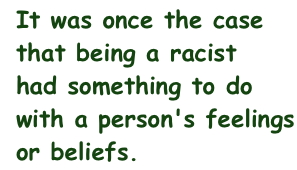 That is, it was once the case that being a racist had something to do with a person's feelings or beliefs. And as for the latter, it did not matter if those beliefs were true. For example, if you believed that having black neighbors would lower the value of your home, your belief was probably true. But if you said that you didn't want to live in a neighborhood where there were black people and you cited declining property values as your reason for wanting to move, your belief about blacks was true, but at least some people would consider you a racist. Not a lynch-favoring racist, but a racist nonetheless.
That is, it was once the case that being a racist had something to do with a person's feelings or beliefs. And as for the latter, it did not matter if those beliefs were true. For example, if you believed that having black neighbors would lower the value of your home, your belief was probably true. But if you said that you didn't want to live in a neighborhood where there were black people and you cited declining property values as your reason for wanting to move, your belief about blacks was true, but at least some people would consider you a racist. Not a lynch-favoring racist, but a racist nonetheless.
When I was ready to enter kindergarten in 1954, my mother, a Catholic, did not want me to go to a Catholic school. (She herself had not found the experience of a Catholic education to be one to which she wished to subject her children.) She visited the local elementary school in Baltimore — Brehms Lane Elementary School, now a charter school — and spoke to the female (!) principal. I was not present for most of the interview, but as she was leaving the principal's office, Mom asked the principal whether there were "coloreds" in the school, and the principal assured her that there were none.
I suppose most readers will say that my mother was a racist for asking the question or even considering it. But was the principal a racist for answering it? After all, it was not the principal's fault that no blacks lived in the district served by Brehms Lane at the time. It was not her fault that parents were required to send their children to neighborhood schools, or that they could not send them to schools wherever they might want in the Baltimore City School System. And it was not her fault that what she said was true. No one can know at this date what the principal's views on the subject may have been, but at least in this exchange, I have to think that she expressed no view tinged with a racist motive or belief.
I'm sure there are readers who will disagree with me, but we don't need to go into that.
There is another thing I must mention at this point. There was also a time — again in living memory — when the first word to spring to mind about a person who might ask about the "coloreds" in a Baltimore elementary school was not "racist." It was "prejudiced." Even as late as 1971 (October 16, if it matters), in a flashback episode of the TV show "All in the Family," when Archie meets Gloria's new boyfriend, Michael, and expresses some severely raw anti-Polish sentiments, Michael in his exasperation cries out that Archie is ... "prejudiced."
Once the various "civil-rights" acts of the 1960s made it illegal to "discriminate" against others in commercial transactions on the basis of their race, a certain legal problem arose. How was one to prove in a court of law that a particular action resulted from illegal discrimination? Discrimination had become, it seemed, a matter not of action, but of motive. There was no way to penetrate into the mind of the accused, and it was certainly easy for anyone accused of discriminating to claim that the motives for his actions were other than racial prejudice.
A new standard had to be devised, and it was. And it was attached to an old word, to wit, "racism." (Well, not really an old word. Neither it nor "anti-Semitism" even occurs in Shakespeare's Merchant of Venice, where one would most naturally look for them. In fact neither word existed until the 20th century.) The standard was "disparate impact."
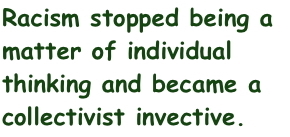 The value of "disparate impact" was that it allowed accusers to look at behaviors and their results, and apply the dreaded word "racism" to them without having to inquire into the motives or thinking behind them. Implicit in the new use of the word, however, was that the motives or thinking had been established by a statistical examination of the results of a person's behavior, and the person's motives were reprehensible merely on the basis of the consequences of certain decisions.
The value of "disparate impact" was that it allowed accusers to look at behaviors and their results, and apply the dreaded word "racism" to them without having to inquire into the motives or thinking behind them. Implicit in the new use of the word, however, was that the motives or thinking had been established by a statistical examination of the results of a person's behavior, and the person's motives were reprehensible merely on the basis of the consequences of certain decisions.
Philosophically speaking, racism stopped being a matter of individual thinking and became a collectivist invective. It lost the individualist character it had when your neighbor didn't want to sell his house to a black family, and it took on a collectivist character. Your neighbor became a racist because of institutions he could be associated with, and collectives of which he may not even have thought of himself as being a part. It applied no longer to individuals as individuals — persons with their own motives and interests — but to individuals understood as members of collectives and institutions.
Entire institutions and policies could be labeled as racist, along with the people associated with them, and no one would ever have to argue that anyone had been motivated by any dislike for anyone else. It was not enough to make the simple factual statement that a particular policy harmed this group or that or was disadvantageous to it; the policy had to be stigmatized with the label "racist." And the evidence for the stigma was the statistical outcome, that is, that not enough blacks were hired or not enough had been successful in negotiating certain kinds of contracts.
Racism became the greatest evil in society. It was not "who we are," as they say. A murderer or a rapist, an embezzler or a wife abuser could hope to be reabsorbed into polite society after suitable demonstrations of remorse or reform. Not so the racist. Perhaps only the child molester was so reviled.
(I must pause to admit the necessity of some qualification here. Certain persons self-identified as racists by virtue of their membership in, say, the Ku Klux Klan, could be forgiven for their lapses. The political dynamics are a little hard to follow, but that they exist can hardly be denied. Thus, in 2010 Bill Clinton could excuse the membership of the Democratic senator Robert Byrd in the KKK; but in 2002 the Republican Trent Lott had to resign his position as majority leader of the Senate once people decided to make an issue of his kind words, spoken on more than one occasion, for the presidential candidacy of fellow senator Strom Thurmond as a Dixiecrat in 1948. In short it was easier to be forgiven for burning crosses in front yards than it was to be forgiven for praising a man — not for being the man, mind you — but for praising another man who had supported segregation. I leave it to others to propose explanations.)
Over the years, more and more practices, policies, and institutions were labeled "racist," where no intent or invidious purpose could be reasonably alleged. There was a debate in Fairfax County in the 1970s about a certain street. Like many streets in Northern Virginia, its name changed when it intersected a (more or less) perpendicular street. Since I do not recall which streets were at issue, I shall call the perpendicular street Brehms Lane. It happened that on one side of Brehms Lane the intersecting street bore the name A Street, and on the other side B Street. It was asserted that this was a racist state of affairs. The basis for this claim was that many black families lived on A Street, but very few on B Street. For several years, real estate agents had been legally prohibited from telling their clients whether there was a substantial black population in a neighborhood in which the client might be interested. But in this case, when the real estate agent identified an address as being on B Street, he was implicitly telling the would-be homebuyer that the neighborhood was populated by few if any blacks. Those making this convoluted argument were insisting that it was necessary to change the name of B Street to A Street, so that the mere name of the street would not be informative (though of course the street address would probably continue to be informative).
It is perfectly obvious that it had taken years for the facts of residence on one side or the other of Brehms Lane to sort themselves out in the manner alleged. It was also perfectly obvious that no one could ever be found who had supervised the sorting out of the two neighborhoods. In fact, the role played by Brehms Lane in this division may even have gone unnoticed by a majority of homebuyers. It was the division itself that was racist, not any person or group of people as people. It was the county that was racist, or at least the street-naming department of the county. And anyone who opposed the renaming was also a racist.
That was the one respect in which the beliefs or feelings concerning race remained a factor in the judgment. Once the institution or organization had been found to be racist, anyone who disagreed with this determination was indeed a racist. Disagreement with accusations were also determinants of what counted as racism.
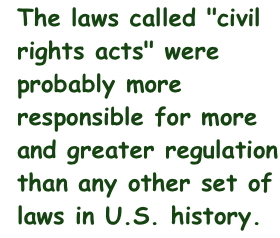 It did not take long for us to be hearing over and over about the discriminatory, i.e., racist, hiring practices, or promotion practices, of this or that company or corporation; and the corporations so accused were more than happy for the accusations to be dropped and to disappear from headlines. To that end, they paid millions of dollars in class-action lawsuits claiming that people had been offended or injured. The assertions by officers of the corporations that there had been no intent to discriminate were completely irrelevant and gave them no relief from the accusations. Pay-offs to race hustlers succeeded where protests of innocence were of no avail.
It did not take long for us to be hearing over and over about the discriminatory, i.e., racist, hiring practices, or promotion practices, of this or that company or corporation; and the corporations so accused were more than happy for the accusations to be dropped and to disappear from headlines. To that end, they paid millions of dollars in class-action lawsuits claiming that people had been offended or injured. The assertions by officers of the corporations that there had been no intent to discriminate were completely irrelevant and gave them no relief from the accusations. Pay-offs to race hustlers succeeded where protests of innocence were of no avail.
In just a few short years, accusations of racial discrimination became the primary instrument whereby the state's authority and influence invaded and grew in society. The various laws called "civil rights acts" were probably more responsible for more and greater regulation than any other set of laws in U.S. history. Moreover, often the so-called laws were not laws at all, at least not in the sense of having been created and passed by some legislature. They were usually court decisions.
The regulations and decisions regarding "discrimination" (and complaints resulting in them) were found to be productive, by expansion, into grievances by women, Asians, homosexuals, and others even when the accusations had no racial component. The operative word became "minority." Any group who could successfully claim to be a minority had access to the protocols of anti-discrimination laws that racial minorities were using successfully. (Women, of course, are not a minority by any numerical meaning of the word. That they have attained the status of being a kind of "honorary minority" exposes a manipulation of English for political ends that is imperfectly known or documented. The columnist and essayist Joe Sobran was one of the few who could pick up on manipulations that were obvious — but only after he had drawn attention to them — and those manipulations relating to our subject were only, if you will excuse me for saying so, a minority of them.)
The most unlikely actions became tarnished with the dread labels. Liberals, who one would have thought on the basis of what they said about themselves would be vehement defenders of the freedom of speech, turned out to have doubts about its sacredness when it came to matters involving racial or other "discrimination." I have already alluded to the legal circumscribing of the free speech of real estate agents, but that circumscription was greater than merely telling would-be buyers who lived in particular neighborhoods; it was career suicide for them even to mention the crime rates in particular neighborhoods.
And it was not just the speech of realtors that was under attack. In 1994 a HUD program, "Moving to Opportunity," generated a number of protests in Baltimore by white middle-class people who objected to HUD's moving lower-class blacks from the public-housing projects into their neighborhoods. HUD actually toyed with the possibility of filing discrimination lawsuits against the protesters for protesting, with the claim that there could be no legitimate reason for them to object to the program other than racism. The program was quickly terminated and the HUD secretary, Democrat Henry Cisneros, concluded that it was unwise "to offer a program like this during an election year." The important thing to notice here is not that the program was not implemented; it is that accusations of racism could be used to threaten or even stifle the exercise of free speech and redress of grievances, and official liberal voices were raised only to protect re-election prospects.
Anti-Semitism, a special kind of racism
Joe Sobran learned that if one should wonder aloud whether the American alliance with Israel was in America's (and Americans') interest, the charge of anti-Semitism (a form of racism) was soon to follow, and withal exclusion from publications and forums in which he would otherwise have been welcome. Even death did not put an end to the slanders and libels that followed on such accusations, and almost no one except his admirers mentions Sobran these days without at least intimating that he was an anti-Semite and making some apology for it.
But it may be said that Sobran was writing in conservative outlets. And conservatives are notorious for exiling their own. Even Russell Kirk was not safe from the neoconservatives' penchant for Trotskyite denunciation and marginalization. Surely libertarians are not so spineless.
I ask you to consider the cases of Hans-Hermann Hoppe and of Robert McGee. In the
(It is worth noting here that FEE was generally thought to be friendly to revisionist history in the past. In particular, one of their long-time seminar speakers was Percy L. Greaves, who specialized in Pearl Harbor revisionism. His wife, Bettina Bien Greaves, is still listed as a resident scholar and trustee of FEE.)
The following month, Robert McGee wrote an article in which he contended that Palestinians were suffering numerous human-rights abuses by Israel, which was receiving help to commit those abuses from the U.S. taxpayer in the form of foreign aid. In response to outrage from Zionists and Israel Kirzner, who was on the FEE board of directors, the president of FEE, Hans Sennholz, fired the editor of the November issue, the book review editor, and the editor of the December issue. Sennholz also announced that the three fired editors would have no further association with FEE so long as he was president. McGee provided his account of the matter in the
Egalitarianism, collectivism, and reductionism
Speech was circumscribed in other ways. News reports of crimes deliberately omitted the race of the accused. Exceptions were made when whites had committed crimes against blacks, but otherwise the accepted orthodoxy was that race was irrelevant in reporting a crime. Even to ask the race of a perpetrator was imprudent. A kind of egalitarianism had swept the nation, and rare it is for any intellect to wonder aloud just how relevant race is to any fact that may be under discussion. The example of James Watson, whose Sunday Times interview resulted in his being removed from every post of honor he held (except his teaching post, for he was tenured) and in his being universally reviled and driven to the brink of poverty, serves as a warning to us all.
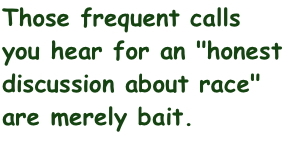 Examples could be compounded almost without limit, all serving as the same morality tale: question egalitarianism, particularly the equality of the races or other "minorities," in America, and life as you know it is over. Those frequent calls you hear for an "honest discussion about race" are merely bait: answer them and lose your job, lose your social status, lose your friends, perhaps lose your family. It's a way of sifting out the non-conformists in a society that wants an honest discussion about race no more than it wants an epidemic of German measles. A similar lesson was learned by James Damore, a software engineer at Google, who believed he was starting an "honest discussion" about sex differences as they apply to the career choices of women.
Examples could be compounded almost without limit, all serving as the same morality tale: question egalitarianism, particularly the equality of the races or other "minorities," in America, and life as you know it is over. Those frequent calls you hear for an "honest discussion about race" are merely bait: answer them and lose your job, lose your social status, lose your friends, perhaps lose your family. It's a way of sifting out the non-conformists in a society that wants an honest discussion about race no more than it wants an epidemic of German measles. A similar lesson was learned by James Damore, a software engineer at Google, who believed he was starting an "honest discussion" about sex differences as they apply to the career choices of women.
This modern egalitarianism is championed under the banner of "diversity," a term popularized in this technical meaning by Bill Clinton during his administration, and which has its roots (again, in this technical sense) perhaps in the writings of Carroll Quigley, one of Clinton's teachers at Georgetown. To quote from the Wikipedia entry:
Quigley's work emphasized inclusive diversity as a core value of Western Civilization, contrasting it with the dualism of Plato. He concluded [his 1966 book] Tragedy and Hope with the hope that the West could "resume its development along its old patterns of Inclusive Diversity." From his study of history, "it is clear that the West believes in diversity rather than in uniformity, in pluralism rather than in monism or dualism, in inclusion rather than exclusion, in liberty rather than in authority, in truth rather than in power, in conversion rather than in annihilation, in the individual rather than in the organization, in reconciliation rather than in triumph, in heterogeneity rather than in homogeneity, in relativisms rather than in absolutes, and in approximations rather than in final answers."But surely all this is familiar in general terms if not in the specifics even to the average reader, who will be wondering what all this has to do with libertarians.
Before I answer that question, let me say that it is my desire not to mention any more groups or persons by name. My purpose is not to discredit, embarrass, or mock any organization or personality; there will be no footnotes. A name will sometimes be unavoidable, but such is the plan I intend to follow insofar as I can. I recognize that it imposes a hardship on the reader who may wish to double-check my assertions. Such readers, I am sorry to say, will simply have to do their own research to see whether what I am about to describe is true. I think they will find that the effort will not be arduous.
Almost imperceptibly, and no date can be assigned to the event, libertarians began to accept at least some of the discussion as set by the Left and its tenets of egalitarianism. The idea of "equality under the law" or "equality in the eyes of God" or even "equality of rights" was gradually supplemented by the idea of equality in other respects. To be sure, libertarians did not fall into calling for an equality of outcome, but "equality of opportunity" as a slogan did rear its head from time to time.
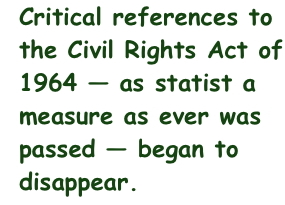 Small obeisances to the dominant views of American history and of despised legal institutions began to show up here and there. The evils of slavery in the American South were being mentioned and amplified a little more often. Reverential references to
Small obeisances to the dominant views of American history and of despised legal institutions began to show up here and there. The evils of slavery in the American South were being mentioned and amplified a little more often. Reverential references to
And always there were the implicit apologies! If a writer did want to object to anti-discrimination laws, it was necessary to fold into the objection some "acknowledgement" that discrimination, though it should be legal, was probably nevertheless stupid, ill-conceived, or wicked. Libertarians who talked about discrimination began to sound like attorneys for pornographers in the 1960s who argued that even filthy smut peddlers had rights that were protected by the Constitution.
Every now and then there would burst on the scene the need to discuss admissions practices of universities and quota systems. Normally the lead objections were taken by conservatives who would cravenly admit the need for redress of past injustices to blacks and propose systems or procedures that were not so objectionable as the ones under dispute at the time. Libertarians could avoid involvement by hiding behind the point that schools should be free to admit whom they wished for whatever reasons they wished, or behind the point that state schools supported by the taxpayers should not be race-conscious. But to get involved in those discussions in any manly way was not to be their practice. For the most part, the only libertarian — or semi-libertarian — who was willing to discuss anything like the issues James Watson had raised was Michael Levin.
In its August 1974 issue, Libertarian Review published a favorable review of John R. Baker's Race by Hans Eysenck and favorable reviews in its December 1973 issue (also by Eysenck) of Arthur Jensen's Genetics and Education and R.J. Hernnstein's I.Q. in the Meritocracy. Its April 1974 issue carried opposing reviews of Steven Goldberg's book The Inevitability of Patriarchy and George Gilder's Sexual Suicide by Riqui Leon (negative) and Murray Rothbard (positive). It is almost inconceivable that such reviews would appear in any libertarian publication today, except of course for Riqui Leon's review, which consisted of the sorts of flutterings we are now accustomed to: insults and gasps of horror that modern society's egalitarian view of sexual differences should be challenged, along with shivers of disbelief that anything so retrograde would be considered (gasp!) in a libertarian publication.
People who at one time might have referred to the United States in its founding as the freest country in history began instead to refer to the United States in its founding as the freest country in history "except for slavery." I would have thought "even with slavery" would have been closer to the truth. And as time wore on, the qualification became something like, "with the tragic exception of slavery."
It was no longer enough to tell us how evil Woodrow Wilson was in getting the United States in a war when it had not been attacked or how evil had been the violations of rights while the United States was in that war. No, in order that we fully understood just how evil Wilson was — getting American citizens killed by the thousands was apparently not bad enough — we had to be told he was a racist.
It did not matter that the particular article might be about World
One almost gets the idea from reading such accounts that libertarians could somehow forgive Wilson for going to war and violating rights on a massive scale, if only he had waited a year so that he could show Griffith's "Intolerance" instead.
It looked as though an epidemic of infected writing was in the works. An author of an article on stop-and-frisk could not object to the practice solely on the basis of the rights violated by the policy. Oh, no, what really made it wicked was that it was racist, and nothing Heather Mac Donald might say about it would change anyone's view about that. The outsourcing of America's prison industry to connected "private" enterprise would have been defended by certain policy-wonk libertarians if only it were not (horribile dictu) ... racist. And what really makes the number of men held in U.S. prisons a scandal is that a disproportionate number of them are black. Presumably getting the proper quota of Jews and Latvians into prisons would make the policy palatable.
You want to talk about segregation? Be sure to mention that America's past government policies with respect to blacks were odious. Or disgusting. Or uniquely abhorrent. Make sure you refer to U.S. history with respect to racial injustice as shameful, brutal, or disgraceful. One writer even referred to it as America's ultimate disgrace. Now, I would have thought that fire-bombing the civilians of Dresden, or dropping nuclear weapons on the civilians of Hiroshima and Nagasaki, or carrying out genocide upon American Indians — I mean, Native Americans — would have qualified for that prize. But, nope, it's the racism of its history.
(I almost anticipate that some critic of this article will challenge me on whether I think that slavery was evil. You are not allowed only to use facts of any sort when you write about slavery. You must tranquilize your tender readers with the message that you are like them and you respect their delicate sensibilities that so need reassurance every time the subject comes up.)
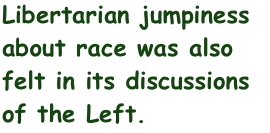 Social Security was condemned on any number of accounts in studies done during the 1970s, but the kicker was that, because blacks do not live as long as whites, and therefore do not derive as much in benefits as whites — this according to one libertarian policy-wonk paper — the program is racist.
Social Security was condemned on any number of accounts in studies done during the 1970s, but the kicker was that, because blacks do not live as long as whites, and therefore do not derive as much in benefits as whites — this according to one libertarian policy-wonk paper — the program is racist.
A libertarian conference was held not so very long ago dealing with the drug war and its racist component. Not, I would have thought, the most salient point.
Libertarian jumpiness about race was also felt in its discussions of the Left. It was possible to read lengthy dishonest articles explaining what libertarians had in common with leftists that would make it possible for them to work together. A few incompatibilities might be mentioned and dismissed, but the injustice of anti-discrimination laws was not even whispered as having a role in the discussion, even though it was patently obvious that there would never be agreement on that point.
Lonely indeed the one libertarian writer who could be depended on to defend discriminatory hiring practices explicitly, and even he might occasionally add, "no matter how evil or stupid we may think the reasons."
Elsewhere, it was assumed that no libertarian would ever defend the covenanting of neighborhoods. Perhaps he would defend the right of a homebuilder to insist on racial covenants as a part of future sales documents, but never, no never, could he mention such a right without making it clear, by mere assertion and without argument, that it was odious or hateful to do it. Such things could not be mentioned in peace and left to the reader to form his own responses. Instead, readers had to be guided to have the correct attitudes and make the correct responses.
In a misguided effort to work with the Left, one libertarian publication allowed a leftist writer in its pages to praise the work of Antifa in shutting down a solitary "white power" advocate who published on the Internet under a
One libertarian writer even wrote that sit-ins at lunch counters whose owner had plainly posted, "No blacks allowed," did not violate his property rights. I suppose "Employees only" on a bathroom door would be allowed, but not a sign on the front door referring to race. Surely here, if anywhere, one would expect the property-rights sentiments of libertarians to make themselves felt. And for the purposes of this article, it does not matter what the arguments were that the writer cited. What matters is that he was bending over backwards to make them, as though the sit-ins of the 1960s were still a burning issue.
The libertarian vulnerability
It would seem that libertarians have adequately protected themselves against the charge of racism, would it not?
But this cannot be. Perhaps you noticed it as you were reading. Libertarians had gradually accepted disparate impact as the basis for their claims of racism. There is no way to condemn stop-and-frisk as racist without accepting disparate impact as your basis for charging racism, unless you are willing to interrogate everyone who orders it or carries out the order. Even black and Hispanic cops carry out those searches.
There is no way to say that the drug war is racist without making disparate impact the basis for the claim, rather than the feelings or beliefs of the people who pass the laws or those of the people who enforce them. Talk all you want about white convictions versus black convictions, and drugs used by whites versus drugs used by blacks. You can make the case that unequal enforcement is racist only by looking at numbers, not at the hearts or minds of the people you wish to accuse. It's a kind of reductionism: we know what is in the heart of people who impose disparate impacts because they impose disparate impacts.
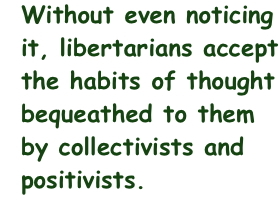 It's easy enough to make the case that originally drug laws were racist, having been passed with an explicit racist intent. Roy Childs was one of the first libertarians to make this point at a presentation he gave in Washington. The people who passed the original anti-drug laws were pretty explicit about who were the targets of their legislation.
It's easy enough to make the case that originally drug laws were racist, having been passed with an explicit racist intent. Roy Childs was one of the first libertarians to make this point at a presentation he gave in Washington. The people who passed the original anti-drug laws were pretty explicit about who were the targets of their legislation.
But we are not talking about the origin, but rather the current patterns of enforcement. And to make the case that those patterns are racist, one cites numbers. And in citing numbers, one is implicitly accepting disparate impact. To cite disparate impact as evidence, we are looking at a sequence of events. We are not asking questions about cause and effect. Racism (and its subset anti-Semitism) has become a description of events, not an explanation for the actions that men take. We reduce men's beliefs and feelings to numbers, and then we group people together into an appropriate collective. Without even noticing it, libertarians accept the habits of thought bequeathed to them by collectivists and positivists.
But still, you may say, it sounds as though libertarians accept the modern thinking on racism. And they have shown themselves willing to act decisively where there is suspicion of anti-Semitism. What's the problem?
The problem is this: ask any libertarian what he thinks about welfare. What he thinks about public housing. What he thinks about Pell Grants and Head Start and other education programs. What he thinks about anti-white hiring practices.
Ask him what he thinks of congressional redistricting undertaken to ensure the election of blacks to Congress. Or busing white children into predominately black schools. Or ending foreign-aid programs.
If he is honest, if he is not a coward, he will tell you that they all must go, and the sooner, the better. And that means he will have voiced his opinion to allow a disadvantage to fall with disparate impact on blacks. In a powerful way.
Nearly all libertarians favor repealing Great Society programs that benefit primarily blacks and were designed to benefit them. Repealing them will not have an "equal" effect on whites and blacks. Repealing them will have a disparate effect on blacks.
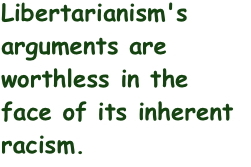 And as soon as those opinions are voiced — nay, thought — the libertarian brands himself a racist. He may have only benevolent thoughts about his dark brothers, but he wants to hurt them economically in a way that does not hurt so many whites. Let him try to explain how much better blacks will fare in a free market. Let him see how far that gets him. How far did it get Thomas Sowell?
And as soon as those opinions are voiced — nay, thought — the libertarian brands himself a racist. He may have only benevolent thoughts about his dark brothers, but he wants to hurt them economically in a way that does not hurt so many whites. Let him try to explain how much better blacks will fare in a free market. Let him see how far that gets him. How far did it get Thomas Sowell?
No, by the terms of the debate as they exist (and not what we may want them to be), terms that so many libertarians have accepted, libertarians are racists. Indeed, libertarianism is a racist doctrine, and to be abhorred by all right-thinking, right-feeling people. Its arguments are worthless in the face of its inherent racism.
Libertarians are not just racists. They are necessarily racists. Inherently racists. Not just happen-to-be racists because they didn't support Barack Obama for president. Deep-down, irredeemable racists. Racists to the core. None of their protests and none of their past writing will save them. If they advocate ending
"Stop-and-frisk" affects only blacks living in certain areas and primarily only the young men at that. The same is true of the drug laws and the prison statistics. But repealing Great Society programs affects women and children, and even a large number of respectable, law-abiding black men. Those repeals would have so all-embracing a "disparate impact" on blacks that they might even be called genocidal. One can almost hear libertarianism's enemies declaring that the disparate impact of libertarian repeals almost makes the Jim Crow laws seem mild by comparison. Such will be the thanks libertarians can expect for trying to protect and enlarge the liberties of those they imagine they will be helping. (This applies with equal force to the libertarian position that the Indian reservation system and welfare for Indians should also be repealed.)
It will not matter a tad whether libertarians think James Watson was right or wrong. Even feverishly denouncing the writings of Arthur
Perhaps they will even support the removal of statues of Confederate generals on the grounds that erecting memorials is not a proper function of government. Or perhaps they will object to removing them, but only because of the expense to the public treasury. No matter. They want the government to stop sending money to black families, and they are racists. Let them try to say that the only reason they have a dim view of Lincoln is that secession was lawful or that he violated
If that weren't problem enough, the foreign policy they favor would be. The noninterventionist policies they recommend would have a disparate impact on Israel, and their rejection of foreign aid entails an end to aid to Israel, and their refusal to go to war in its behalf will be called an abandonment of an ally left to die. Advocating that policy brings with it the charge of being anti-Semitic, as Sobran and McGee discovered. Moreover, libertarians' ability to perform simple arithmetic might also lead them to recognize that Adolf Hitler is not the greatest mass murderer in history after all, that in terms of lives destroyed he comes in behind Stalin and Mao Zedong. That will surely win them the anti-Semitic brand, if not the "Holocaust denial" brand.
The reduction of domestic spending "disparately impacts" blacks, and the reduction of foreign spending "disparately impacts" Israel.
What can libertarians do about this? Very little, I'm afraid. They have tied themselves into a knot worthy of a Gilbert and Sullivan comedy. The problem is that in adopting disparate impact as their standard for racism, they have accepted the terms of the discussion set by collectivists. It would help if they could bring themselves to eschew using the disparate impact standard, if they would cease to reduce mental acts to external numbers. It would help if they de-legitimized the term entirely, not only in their own writing, but wherever they encountered it, insofar as it is possible at this late date.
If they will return to the individualism that gives rise to libertarianism, they can limit the use of the term "racism" and its derivatives in their own writings to the feelings and beliefs of individual persons. When they do that, they will discover that the possibilities for calling anything racist are severely limited, and they can return to focusing on rights and their contravention.
For constitutionalists, there is a parallel: if the government limited itself to its Constitution, many functions it now performs would disappear. If libertarians in general will limit their use of the (mostly useless) term "racism" to its dictionary meaning (let us say, pre-1968 dictionary meaning), most of the functions it performs in their discourse will disappear. The reason this will be of little help to them, however, was given by Sam Francis in the
Libertarians must come to grips with just how radical their philosophy is, and they should embrace that radicalism heartily and unwaveringly, even brashly. We are not "just folks," and we do not fit in with the contemporary political "dialogue." Radical thinkers of the past did not try to make their positions fit into the contemporary "dialogue," and libertarianism is not just radical. If you will excuse the expression, libertarianism is "radically radical." Libertarians do not advance their cause if they tone down the radicalness of their views in order to "make a difference," or to raise money from squeamish donors, or to have influence in the halls of Power. The cause of liberty is based on truth, unassailable truth. And the louder libertarians profess it and the more consistently they defend it, the better the chances that it will be heard. I do not say that the Truth will out. But I do say that Whispered Truth and Diluted Truth will not. Truth honeyed with the shibboleths of the Left or the Consensus Universe is Truth betrayed. Let us be proud to say "sibboleth," and mark ourselves as not belonging to the tribe of our opponents.
 There is no compromise with collectivism. It is certainly possible to work with non-libertarians, for there are honorable people — both on the Left and on the Right — who are not libertarians with whom we will share goals and views. But there is no working with collectivist movements. Temporary appearances to the contrary, libertarianism has no movement allies. And every time libertarians have sought to make an alliance with some other group, it was not long before that group turned on them and denounced or trivialized their most cherished ideals. We have tried to form alliances with the New Right (conservatives of the 1950s and YAF), the New Left (in the days of Carl Oglesby), the paleoconservatives (especially in the run-up to the Gulf War), and the mainstream Left during times of war (whose opposition to war, with a few exceptions, was only an opportunistic and partisan pretense). There was even a brief flirtation with neoconservatism in its very early days, when neocons described themselves as "liberals who had been mugged by reality." Were movements men, we could almost say that libertarianism is the man against whom every other man's hand is turned.
There is no compromise with collectivism. It is certainly possible to work with non-libertarians, for there are honorable people — both on the Left and on the Right — who are not libertarians with whom we will share goals and views. But there is no working with collectivist movements. Temporary appearances to the contrary, libertarianism has no movement allies. And every time libertarians have sought to make an alliance with some other group, it was not long before that group turned on them and denounced or trivialized their most cherished ideals. We have tried to form alliances with the New Right (conservatives of the 1950s and YAF), the New Left (in the days of Carl Oglesby), the paleoconservatives (especially in the run-up to the Gulf War), and the mainstream Left during times of war (whose opposition to war, with a few exceptions, was only an opportunistic and partisan pretense). There was even a brief flirtation with neoconservatism in its very early days, when neocons described themselves as "liberals who had been mugged by reality." Were movements men, we could almost say that libertarianism is the man against whom every other man's hand is turned.
We cannot trick others into thinking they are "one of us." They know themselves very well, and they will not be tricked into rejecting the state and its power. It's very well for our historians to tell us that historically our roots lie with the anti-state Left, and that we and they are natural allies. But the Left has changed, and what is natural in an alliance with them now is what was natural in the alliance of Aesop's fox and donkey with a lion. In such an alliance, we shall be lucky if we fare as well as the fox, rather than as poorly as the donkey.
What libertarians must do is face up to the essential radicalness of their position and embrace it. Defend it. And not cozy up to those who would weaken it or dilute it. When the attacks come with charges that libertarians are racists, as come they will, it may be that libertarians will suffer the fate of others who have been overwhelmed by absurd accusations of being Nazis or Kluxers and are simply swept away. Or it may be that libertarianism's radicalism forms so great a difference between libertarians and all others that anyone who accuses them of any sort of collectivism whatever will be seen as simply ridiculous.
And though strictly speaking it is not a part of the libertarian "program," it would not hurt if more libertarians were more vociferous about defending fellow libertarians who are accused of racism or anti-Semitism and rushing to their aid when their websites are hacked or blocked, and their PayPal accounts frozen. It would not hurt if they protested the flighty, capricious, and irresponsible use of those accusations by the Southern Poverty Law Center and others, and in particular if they objected to the unquestioning use by law enforcement and the media of unexamined slurs. And it would not hurt if libertarians made some visible effort to distance themselves from the collectivism of disparate impact.
There is only one other alternative for them, and I much fear that it, and not the suggestions I have made, is the one libertarians will in the end take: find a way to keep all the welfare programs intact and still call themselves libertarians. Find a  way to argue that welfare rights are genuine rights. And if they can finesse their non-interventionist foreign policy to exempt Israel, they will have shielded themselves from being accused of anti-Semitism. None of these strategies is as absurd as it may sound at first. After all, the 2016 Libertarian Party candidate for president declared himself willing to surrender the individual's right of association and enforce anti-discrimination laws. Instead of hooting at him, despising his views, and publicly repenting of the nomination, plenty of libertarians made excuses for him and voted for him anyway. I'm sure there are policy-wonk libertarians who are up to the challenge
of doing the same with welfare and aid to Israel. I see a bright future here for the "humanitarian" and "thick" libertarians. Ω
way to argue that welfare rights are genuine rights. And if they can finesse their non-interventionist foreign policy to exempt Israel, they will have shielded themselves from being accused of anti-Semitism. None of these strategies is as absurd as it may sound at first. After all, the 2016 Libertarian Party candidate for president declared himself willing to surrender the individual's right of association and enforce anti-discrimination laws. Instead of hooting at him, despising his views, and publicly repenting of the nomination, plenty of libertarians made excuses for him and voted for him anyway. I'm sure there are policy-wonk libertarians who are up to the challenge
of doing the same with welfare and aid to Israel. I see a bright future here for the "humanitarian" and "thick" libertarians. Ω
October 17, 2017
© 2017 Ronald N. Neff
Published in 2017 by WTM
Enterprises.
To the editor ...
Anent Wilson's showing of "The Birth of a Nation," a motive other than its quality and distinction may have been the fact that the second half of the movie (the half that deals with Reconstruction) is introduced by a couple of inter-titles that quote extensively and favorably from A History of the American People, published in 1902 by ... Woodrow Wilson.
Modine Herbey
January 8, 2018